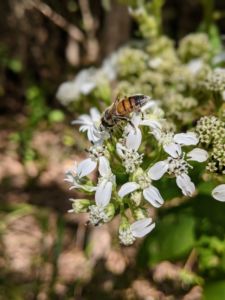Fall is a favorite season for many, but changing temperatures and allergens can put a strain on your immune system. It’s hard to enjoy a pumpkin spice latte if your nose is stuffed. Here’s how to prevent and treat the most common fall ailments.

Allergies
Sniffles in the fall might signal a head cold, but they could also indicate allergies. Even if you aren’t typically prone to allergies, they can still happen to you. A season with abnormal temperatures or rainfall can cause plants to behave differently and cause allergies in more people. Since allergies are caused by an overreaction of the body’s immune system, people can develop them at any age. Head colds typically come on gradually over a few days and last no longer than ten days. If you have experienced head cold-like symptoms for longer, then it may be allergies.
Over-the-counter antihistamines are effective for some people, as are herbal and homeopathic remedies. Look for medicines that won’t make you drowsy, and be sure to talk to your doctor before starting one if you are on medications or have other health conditions.
Those who suffer from severe or persistent allergies may need to see an allergist and receive “allergy shots.” These are frequent injections that expose a person to a small amount of an allergen so that their immune system builds up a tolerance. Another way to do this is to eat locally produced honey every day. The honey will contain pollen from many of the plants that are bothering you and act as natural exposure therapy. (Never expose yourself to your allergy triggers if they cause anaphylaxis or severe asthma attacks.)
Since allergies are an immune system problem, keeping your immune system healthy can prevent them or at least make them less severe. Chiropractic care has been shown to improve immunity and lessen the severity of allergies and asthma. A healthy diet, plenty of sleep and healthy stress management are also important for immune health.

Colds and Flu
The rule of thumb for telling the difference between a cold and influenza is that a cold will come on gradually while the flu hits you suddenly. If you went to bed feeling alright and woke up feeling like you’d been hit by a truck, then it’s the flu. The flu also tends to cause more severe symptoms. Many scientists are concerned that the 2021-2022 flu season could be worse than usual. Luckily, the Covid-19 pandemic has familiarized all of us with hygiene habits that can protect you and your family from the flu.
Regular hand washing, wearing masks in crowded places, and avoiding contact with sick people are good ways to avoid most illnesses. In addition to this, you may also choose to get the flu vaccine. This is especially recommended for those over the age of 60 and people with underlying conditions. If you feel sick, you may also want to get tested for Covid-19 and avoid contact with other people until you feel better.
Keeping your immunity built up is important. A generally healthy lifestyle that includes a well-rounded diet with plenty of fruits and vegetables and regular exercise is the best way to help your immune system. On top of that, you can take herbs like elderberry, echinacea, or oregano oil if you are beginning to feel run down (but ask a healthcare provider first). Regular visits to your chiropractor will help to keep your nervous system functioning optimally and your immune system in tip-top shape.

Illnesses in Children
If you’re a parent, you probably already know that this year’s RSV season has been oddly timed and severe. RSV is a common viral illness that typically causes mild symptoms in adults but can cause severe symptoms in infants and young children. If your child has had cold-like symptoms and starts having trouble breathing, they should be seen by a doctor immediately. Most children with a bad case of RSV will recover with supportive care in the hospital. Those with milder cases can be cared for at home with remedies like vapor rub, humidifiers, and plenty of fluids. Other serious illnesses like whooping cough and covid-19 can also cause cold symptoms and trouble breathing in children. The only way to know which illness is affecting your child is to get medical care.
Ear infections are another common childhood ailment that can strike year-round but are more common in cold weather months. Children are more prone to ear infections than adults because the tubes in their ears are smaller. This makes it harder for fluid to drain, and accumulating fluid can attract bacteria. Even if bacteria are not present, too much fluid build-up can cause discomfort. A special chiropractic adjustment that focuses on the nerves that control the opening and closing of the eustachian tubes has been proven to help treat and prevent ear infections in children.
You can also try modifying your child’s bed so that they are sleeping on an incline. This allows the tubes to drain better while they are sleeping. (never put pillows or other soft items in the crib with your infant, this can cause suffocation.) Preventing respiratory illnesses and allergies in children can also lower their risk for ear infections.
Children become ill more often than adults because their immune systems are still developing. Like adults, they can benefit from immune-building habits that prevent illness. These include a healthy diet, play and exercise outdoors, enough sleep, and chiropractic care. Children who receive regular chiropractic care catch fewer colds per year than children who don’t.
It’s not possible to completely avoid illness, but a strong immune system and good hygiene habits can reduce the amount of time you and your child spend being sick.
Chiropractic Care for Immunity in Tennessee
At Stanlick Chiropractic, we provide holistic healthcare for adults and kids. We encourage regular wellness care for our patients so that they can spend less time being sick or in pain and more time enjoying life. Schedule a consultation with us to find out how to amp up your immune system for the cold weather months.

